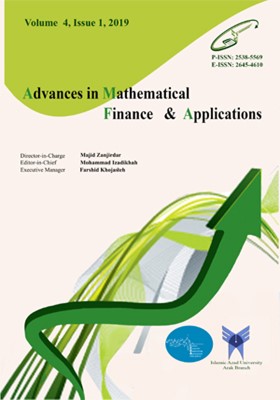Investigating the effect of rounding and revision in predicting earnings per share on investors' attention
محورهای موضوعی : Financial Accounting
1 - Department of Accounting, Arak Branch, Islamic Azad University, Arak, Iran
2 - Department of Industrial Management, Arak Branch, Islamic Azad University, Arak, Iran
کلید واژه: Revision, Rounding, Predicting Earnings, Share,
چکیده مقاله :
Because in the theory of economics, the value of a company is based on the current value of future cash flows and profit is used as a substitute for cash flows, profit forecasting is of particular importance. In the research, the effect of rounding and revision in predicting earnings per share on the investors' attention in Iran has been investigated. After designing the investors' attention assessment indexes, the transaction information was collected from the Stock Exchange in the five-year period of 2011-2015. The statistical sample consists of 120 companies selected by systematic elimination method and totally obtained 600 year-firm. In this research, linear regression and correlation were used to investigate the hypotheses of the research and Eviews software was used to analyze the data and test the hypotheses. What can be said in the summing up and conclusion of the test of research hypotheses is that predicting the earning per share influences investors 'attention, as well as the revision of the earnings per share influences the investors' attention. On the other hand, research studies show that the rounding in interaction with the revision in predicting earnings per share can also affect the investors' attention.
[1] Athanasakou, V., Simpson, A., Investor attention to rounding as a salient forecast feature, International Journal of Forecasting, 2016, 32 (1), P.1212–1233, Doi:10. 1016/j.ijforecast.2016.02.011
[2] Abarbanell, J. S., Lanen, W. N., Verrecchia, R. E., Analysts’ forecast as proxies for investor beliefs in empirical research. Journal of Accounting and Economics,1995, 20(1), P.60–89. Doi:10.1016/0165-4101(94)0039 2-I
[3] Bonner, S., Walther, B., Young, S., Sophistication-related differences in investors’ models of the relative accuracy of analysts’ forecast revisions. The Accounting Review, 2003, 78(3), P. 679–706. Doi:10.2308/accr. 2003.78.3.679
[4] Bradshaw, M. T, Brown, L. D, Huang, K., Do sell-side analysts exhibit differential target price forecasting ability? Review of Accounting Studies, 2013, 18(4), P.930–955. Doi:10.1007/s11142-012-9216-5
[5] Boolou, Q., Babajani, J., Ebrahimi, M., Considering the Information Content of Profitability Components by Managers and Investors in Profit Earnings, Journal of Financial Accounting Research, 2012, 1(4), P.47-66.
[6] Clement, M. B, Tse, S.Y., Do investors respond to analysts’ forecast revisions as if forecast accuracy is all that matters? The Accounting Review, 2003, 78(1), P.227–249. Doi:10.1023/ A:1024417513085
[7] Collins, D. W, Gong, G, Hribar, P., Investor sophistication and the mispricing of accruals. Review of Accounting Studies, 2003, 8(2–3), P.251–276. Doi:10.1023/ A:1024417513085
[8] Dechow, P.M., You, H, Analysts’ motives for rounding EPS forecasts. The Accounting Review, 2012, 87(6), P.1939–1966. Doi:10.2308/accr-50226
[9] Herrmann, D., Thomas, W., Rounding of analyst forecasts. The Accounting Review, 2005, 80(3), P.805–823.
[10] Forster, G., Briloff and the capital market. Journal of Accounting Research, 1973, 43(17), P.262-279. Doi: 10.2307/2490317
[11] Gaspar, J., Massa, M., Matos, P., Shareholder investment horizons nd the market for corporate control. Journal of FinancialEconomics, 2005, 76(9), P.135–165. Doi: 10.1016/j. jfineco.2004.10.002
[12] Gleason, C, Lee, C., Analyst forecast revisions and market price discovery. The Accounting Review, 2003, 78(1), P.193–225. Doi: 10.2139/ssrn.303980
[13] Zimmerman H., Theory of Accounting, The Translation of Ali Parsaeian, Terme Publishing, 2008, 22(3), P.68-99.
[14] Hirshleifer, D., Lim, S.S., Teoh, S.H., Limited investor attention, and stock market misreactions to accounting information. Review of Asset Pricing Studies, 2011, 1(1), P.35–73. Doi:10.1093/rapstu/rar002
[15] Herrmann, D., and Thomas, W.B., An analysis of segment disclosures under SFAS No. 131 and SFAS No. 14., Accounting Horizons, 2000, 14(3), P.287-302.Doi: 10.2308/acch.2000.14.3.287
[16] Hilary, G., Hsu, C., Analyst forecast consistency. Journal of Finance, 2013, 68 (1), P.271–297.Doi:10.1111/ j.1540-6261.2012.01800.x
[17] Hillstrom, A. P., Repetition effects in visual search. Perception and Psychophysics, 2000, 62(4), P.800–817. DOI: 10.3758/BF03206924
[18] Kordestani Gh., Ashtab, A., Investigating the Relationship Between Profit Earning Error and Abnormal Stock Returns on New Stock Trading Companies in Tehran Stock Exchange, Accounting and Auditing Reviews, 2010. 60(4), P.93-108. Doi:10.2307/2491047
[19] Mirzaali, S., Ganjik, W., Explaining the Power of Explanation of Financial Capital in Earnings Forecast of Each Future Share in the Stock Exchange, Fourth International Accounting and Management Conference, and the First Conference on Entrepreneurship and Innovations in Open, Tehran, MehrIshraq Conferences, 2015. 60(4), P.93-108.
[20] Parsaanian, M., Stock Exchange, Department of Public Administration, Faculty of Management and Administrative Sciences, University of Tehran, 2006, 33(4), P.93-108.
[21] Shaalizadeh, B., Investigating the relationship between the difference between the bid price for buying and selling at the rate of stock turnover, market returns and the size of transactions in Tehran Stock Exchange. The 3rd National Conference on the International Conference on Management and Accounting of Iran. Hamedan, 2016, 22(3), P.68-99.
[22] Yamada, A., Mandatory management forecasts, forecast revisions, and abnormal accruals, Asian Review of Accounting, 2016, 24(3), P.68-99. Doi:10.1108/ARA-09-2014-0099
[23] Jokar, H., Shamsaddini, K., Daneshi, V., Investigating the Effect of Investors' Behavior and Management on the Stock Returns: Evidence from Iran. Advances in Mathematical Finance and Applications, 2018, 3(3), P. 41-52
[24] Choong-Yuel, Y., Pae, J., Do Analysts Strategically Employ Cash Flow Forecast Revisions to Offset Negative Earnings Forecast Revisions, European Accounting Review, 2016, 22(3), P.68-99. Doi:10.1080/096 38180.2015.1123102
[25] Zhang, Y., Currim, I. S., Lim, J., Effect of analysts’ earnings pressure on marketing spending and stock market performance. Journal of the Academy of Marketing Science, 2018, 46(3), P.431-452.Doi:10.1007/s11747-017-0540-y


